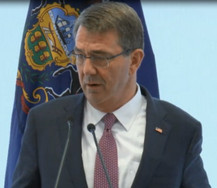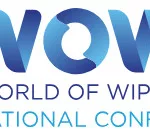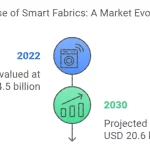Eighth manufacturing innovation institute brings over $300 million in public-private investment from leading universities and manufacturers to develop futuristic fabrics and textiles, helping accelerate the revival of textiles manufacturing in the United States
On April 1, Secretary of Defense Ash Carter announced that a leading consortium of 89 manufacturers, universities, and non-profits organized by the Massachusetts Institute of Technology (MIT) will spearhead a new manufacturing innovation institute in partnership with the Department of Defense focused on securing U.S. leadership in revolutionary fibers and textiles manufacturing.
The new Revolutionary Fibers and Textiles Manufacturing Innovation Institute in Cambridge, MA, will combine over $75 million of Federal resources with nearly $250 million of non-Federal investment in innovative fabrics and textiles with novel properties ranging from being incredibly lightweight and flame resistant, to having exceptional strength and containing electronic sensors. With wide-ranging applications, these technical textiles can forge protective gear for firefighters impervious to the hottest flames, replicate the sensing capabilities of a smart watch into a lightweight fabric, or detect when a wounded soldier needs to be treated with an antimicrobial compression bandage.
This new institute is the eighth manufacturing hub to be awarded by the Obama Administration, building on the President’s vision to create a National Network for Manufacturing Innovation (NNMI) of at least 15 hubs across the country during his Administration. Collectively, the Federal government’s commitment of nearly $600 million to the eight awarded institutes has been matched by over $1.2 billion in non-Federal investment from across industry, academia, and state governments. The institutes, each led by manufacturing experts renowned in their field, have attracted over 800 companies, universities, and non-profits as members of the National Network for Manufacturing Innovation.
The American textile industry is adding jobs for the first time in decades, increasing shipments by 14 percent from 2009 to 2015, and growing exports globally with a 39 percent increase in exports from 2009 to 2015. After a decade in decline during the 2000s, the U.S. manufacturing sector as a whole has added nearly 900,000 jobs since February 2010. Today’s announcement builds on this momentum in American textile manufacturing and lays the foundation for future leadership and innovation in the production of sophisticated fibers and textile technologies.
To lead the new Revolutionary Fibers and Textiles Manufacturing Innovation Institute, MIT is standing up Advanced Functional Fabrics of America, or AFFOA, a new consortium headquartered in Cambridge, MA, uniting 89 partner companies, non-profits, independent research organizations, universities and start-up incubators to help ensure that America stays at the leading edge of fiber science and the production of modern-day fabrics and fibers with extraordinary properties.
This new manufacturing innovation institute will harness the Northeast region’s community of technical textile manufacturing entrepreneurs and innovators, strengthened by a robust nationwide network of manufacturers, to underpin a national fibers and textiles manufacturing ecosystem and position the US for growing leadership in this critical technology area.
The institute will bring together nontraditional partners to integrate fibers and yarns with integrated circuits, LEDs, solar cells, and other devices and advanced materials to create textiles and fabrics that can see, hear, sense, communicate, store energy, regulate temperature, monitor health, change color, and more. For example, the institute will pair the likes of audio equipment maker Bose, computer chip maker Intel, and nanofiber manufacturer FibeRio with more customary textile manufacturers and textile users like Warwick Mills, Buhler Yarns, and New Balance.
The institute will work to commercialize innovations being developed in the labs of member universities including MIT, the University of Massachusetts – Amherst, Cornell University, and others, while partnering with local workforce organizations to train workers on how to manufacture these technologies in the United States. The institute will also accelerate technology transfer to enable defense and commercial applications such as shelters with power generation and storage capacity built into the fabric, ultra-efficient, energy-saving filters for vehicles, and uniforms that can regulate temperature and detect threats like chemical and radioactive elements in order to warn warfighters and first responders. The new institute’s headquarters in Cambridge, MA will host a prototyping facility designed to help start-ups test their first products and scale up new technologies into full production, to ensure that textile technologies invented in America are made in America.
The winning team includes the following 52 industry members and non-profit organizations, as well as 37 additional partners across 28 states:
52 Companies and Non-Profit Organizations: Analog Devices, Ben Franklin Technology Partners, Bluewater Defense, Bose, Buhler Quality Yarns, Business Education Design & Research (BEDR) Consortium, ChK Group, Corning, Delaware Valley Industrial Resource Center (DVIRC) – Southeast PA MEP, DuKorp, DuPont, EHMKE, Electronic Textile, eSpin, FabNewport, Faurecia, FibeRio, Flex, FLIR, Hills, Ikove Venture Partners, Inman Mills, Intel, Macromolecular, Manufacture NY, MassMEP, Medtronic, Milliken, MiniFIBERS, Ministry of Supply, Nanocomp Technologies, Nanoterra, National Occupational Competency Testing Center (NOCTI), New Balance, Nike, Offray Specialty Narrow Fabrics, Per Vivo Labs, Protect the Force, R&M International, RTI International, SAP, Steelcase, Stitch Texas, Ten97 Technologies, The Corridor – FL, The Solar Energy Consortium (TSEC), V2 Composites, Vartest Laboratories, Vecna, Vorbeck Materials, VF Corporation, and Warwick Mills
32 Universities, Colleges and Other Schools: Auburn University, Carnegie Mellon University, Clemson University, Connecticut College of Technology RCNGM-ATE, Cornell University, Drexel University, Fashion Institute of Technology, Florida Atlantic University, Gaston College, Iowa State University, Jefferson University, Kansas State University, Massachusetts Institute of Technology, Ohio State University, Penn State, Rice University, Temple University, University California-Davis, University of Central Florida, University of Massachusetts-Amherst, University of Arkansas, University of Delaware, University of Georgia, University of Illinois (National Center for Supercomputing Applications), University of Kentucky, University of Michigan, University of Minnesota, University of Rhode Island, University of Tennessee – Knoxville, University of Texas – Austin, Virginia Tech, and Washington State University
5 State Government and Regional Organizations: State of California, State of Georgia, Commonwealth of Massachusetts, City of Philadelphia, and Industrial Development Agency (IDA) – Orange County, NY
28 States Represented: AL, AR, CA, CT, DE, FL, GA, IA, IL, KS, KY, MA, MI, MN, NC, NJ, NH, NY, OH, OR, PA, PR, RI, SC, TN, TX, VA, WA
(Source : The White House Office of the Press Secretary Press Release)
The National Council of Textile Organizations (NCTO) welcomed the announcement






